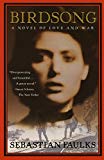
The novel deals explicitly with the contemporary act of recovering the memory of WWI, and compiling contemporary understanding of those narratives—a function common to works of historiographic metafiction, like Pat Barker's Regeneration Trilogy, A.S. Byatt's Possession, and Ian McEwan's Atonement . The literary scholar Jerome de Groot calls Birdsong one of the first novels of its kind, creating a trend in the 1990s of literary fiction rethinking and reflecting on the World Wars and their historical legacy.
Michael Gorra, a professor of English literature, argues that Faulks seeks to demonstrate that "the past can be recovered, its code can be broken; it can be used to add meaning to contemporary life. Its limitations can be overcome and its promises fulfilled because we know it can heal." The deliberate hiding of Stephen's stories, remaining silent to his family after the war's end and encoding his journals, mirrors the actual loss of record and stories from veterans in post-war Britain. Elizabeth's search for that history is a process of recovering that memory in order to gain a greater emotional relationships with her grandfather, to whom she had never felt connected. Writing in the British Medical Journal , the medical doctor Paul Slade described reading about this investigation of another person's history to illuminate how "superficial" his own patient histories practice had been.
Gorra described the novel's split into parallel narratives as the critical fault in the reading experience of the novel. For de Groot, however, the split structure provides one of the most sophisticated elements of the novel. De Groot writes that Benson's investigation of personal history allows Faulks to examine the difference between the two perspectives on the memory, highlighting the "unknowability of the horror of war" and of history more generally.
Like other novels documenting WWI, the shock and trauma of death is embedded throughout the book's depiction of the war. John Mullen, reviewing the book for The Guardian , described the depictions of the Battle of the Somme particularly brutal. According to scholar Marzena Sokołowska-Paryż, Faulks treats the war as a way to "test human endurance" and explore the effect of carnage on the psyche. A reviewer for Kirkus Reviews also highlighted this theme, writing that "the war, here, is Faulks's real subject, his stories of destroyed lives, however wrenching, only throwing its horror into greater relief and making it the more unbearable".
The contemporary historian Simon Wessley describes the novel, alongside Barker's Regeneration , as an exemplar of contemporary fiction which uses the experience of the World War I trenches to examine more contemporary understandings of PTSD. De Groot argues that this reinvestigation of a traumatic history mirrors a growing interest among both literary authors and historians in trauma as a thematic subject.
The historian Ross J. Wilson noted that this reinvestigation of the traumas of the World Wars revisits and revives the experience of trauma within contemporary culture. Faulks uses both different narrators and different narrative perspectives (first, third and omniscient) on the death in the trenches to explore the trauma of death in numerous and challenging ways. For Mullen, this gives the effect of "[t]he novelist painfully manipulat[ing] the reader's emotions."
Already have an account? Log In Now